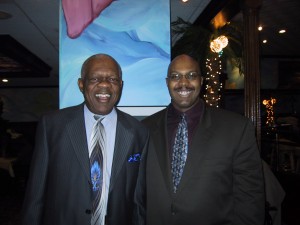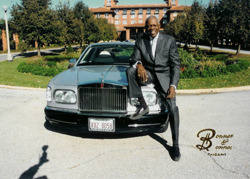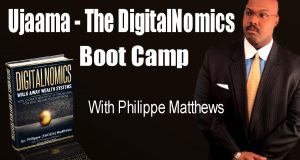
Listen LIVE to Philippe’s Exclusive Interview with
Author of How to Teach Kids To Be Millionaires,
Dr. Cuttie Bacon III!
He’s one of Chicago’s premiere educators and real estate millionaires. A former Superintendent for Chicago Public Schools, Dr. Cuttie Bacon III has emerged as the perfect man to teach kids and everyone how to be a millionaire! An author and mentor, Dr. Cuttie Bacon offers his financial philosophy in this excerpt from the bestselling internet book, How To Make Millions When Thousands Have Been Laid Off featuring Stedman Graham.
Philippe Matthews:
Dr. Bacon, what are your views on saving money for your child’s future?
Dr. Bacon:
“It’s important to save one to two dollars a day for your child because one, it’s a model experience. You are modeling for the child what he or she should do with money. Most parents know how to give a child a dollar or two a day, and let them spend it on useless things like candy, gum and junk. When you constantly do that for twelve years, children grow up believing that a dollar or two has little or no value and the only possible thing to do with it is to race to the drugstore and spend it. Giving a kid the practice of spending two dollars a day for 365 days a year, you show them exactly how to throw away $600 a year, in ten years; they’ve thrown away $6000. If you invest in a mutual fund for the child at 15%, they may very well have $7000 in twelve years. That’s the lesson that you want to give the kid.
“It’s difficult and complex because the basic rules of growing money have not been taught to youngsters, young adults and older adults. Nobody in this country that has limited financial education believes that a dollar or two a day over 40 years will add up to a half a million dollars! The reason being is we do not teach them about compound interest. Compound interest is taught at elite schools and for people who already know what compound interest already is. When you grow up in a family with a trust fund at 12 years old; you are very clear that $100,000 in your trust fund is going to be $1,000,000 when you turn 21 years of age. For example, the Kennedy’s and the Rockefeller’s knew, but if you grow up in a house with a $50,000 a year income, your parents don’t know, your grandparents don’t know so, they understand that to make you happy, is to give you one or four dollars a day to spend. But, if they don’t know that same dollar can grow into thousands of dollars, they can’t depart that kind of information onto their child.”
Philippe Matthews:
How do you save money when you have a low or no cash flow?
Dr. Bacon:
“Families with incomes of $1,000 to $20,000 a year believe that they are locked in poverty, and that they will be locked in poverty for the rest of their lives. When they get a dollar or two, they think the reasonable way to gratification is go to a fast food place, spend it quick and enjoy it. That’s their level of enjoying 4 or 5 dollars because they have no notion of how money grows. Most people who were born in this country were not born into money, and become wealthy by investing a dollar or two a day. They did not become wealthy in this country because they had thousands of dollars to invest.”
Philippe Matthews:
You say there is a difference between saving verses investing. Could you explain the difference?
Dr. Bacon:
“The major difference between saving money and investing money I believe is saving money is the first step toward investing. Nevertheless, someone who saves for 20 years works like this. The average savings account will bring you 5%. If you put 100 to 300 dollars a year into a savings account, you will find out how quickly it will double by dividing 5 into 72 – it’s called Financial Rule 72. 5 into 72 goes 14 times. Therefore, it would take that $300 dollars 14 years to double. Conversely, if you divide 15 into 72, you will find that it goes less than five times; so, in 4.5 years, your $300 will double compared to 15 years.
“I always ask people, ‘Would you rather have your money double in four or five years than fourteen or fifteen?’ So, if you have $300 invested in this year, four or five years from now, you will have $600. Nine years from now, it would be $1200 and fourteen years from now, it would be $2400. If you invested in a savings account at 5%, fifteen years from now, you would have $600. So, you have four times as much money if you invest it in Mutual Funds. In stock, it could be even better. For example, back in the 60’s, I invested a small amount of $5,000 in Abbott Labs, which was very strenuous for me to do at that time. However, that same $5,000 in 1992 was worth a million dollars! So, with your savings account, save until you get $1,000 in the account; then invest it in Mutual Funds and stock. Saving is not where you want your money to go, investing is when you want to double your money.”
 Philippe Matthews:
Philippe Matthews:
We should all know the difference between saving versus spending, but could you clarify this for us?
Dr. Bacon:
“How you spend money really determines what kind of money you are going to have. One of the things that I learned researching millionaires is they have a habit of not spending a lot of money. They spend a small percentage of their earned income and most of them can tell you where every dollar goes. They save money because they don’t spend it. For example, one who can give an account for every dollar spent every day for thirty days can tell you where every dollar went, and they can also look at their spending practices and see where they can save more money the next month. The person who does not keep a record and an account of their spending, has no idea what they can save and they truly believe that they need to spend every penny that they get – whether they make $50,000 a year or $150,000 a year! In the book, ‘The Millionaire Next Door’, one of the constant events that are mentioned throughout the book is that millionaires are very frugal people. They know how to handle a dollar and the reason why they are millionaires is that they have learned how to keep the money and save it rather than spend it.”
Philippe Matthews:
You have used the term “poor rich.” What does that mean?
Dr. Bacon:
“Many people who have $250,000 income have things like $10,000 mortgages a month, it is not uncommon for them to have two $75,000, $100,000 luxury cars that will give them a $2-3,000 car note. Additionally, it is not uncommon that they eat at the finest places, they dress in the finest designer clothes and they spend 125% of their income. You see, spending that much of your income never allows you to accumulate anything in terms of investments, because it takes everything to cover your month-to-month expenses, and each year you get another $20,000 in the red, which leads to what we’ve had in the last two or three years in this country—the highest domestic bankruptcies in the history of this country, along with the highest credit card debt.”
Philippe Matthews:
What are your views on giving children allowances versus wages?
Dr. Bacon:
“I think the way you teach kids about money should be related to real-life experiences. In our adult lives, nobody gives us money for anything. Nobody walks up to us and says, ‘You get so much money every week for breathing.’ In life, you earn it. You either invest it or work everyday, or have a business – you earn your money. Now, if we’re teaching kids to get ready to function as adults, we should not have any false experiences. Every experience should be an educational and learning experience, which means if a child is going to receive $10 a week, he has to earn it the same way an adult does. A job or a service has to be related to it, and the child has to be required to work and be paid for that. If he does half of the work, he doesn’t get $10, he gets $5. If we go to work two and a half days a week, we get paid for two and a half days a week – we don’t get paid for five. So, each one of the experiences with money as it relates to children; I think, has to be related to real-life experiences. Because, the child does not grow up believing that somebody is supposed to give them money.”
“I taught [my children] that I was not going to give them money. Because I brought them up believing that I was suppose to give them money, they would come and ask for loans or gifts of $500 or $600 – whatever they thought they needed. So, I had to reeducate them at 25 years old, for example, my kids would say, ‘Dad is not giving away anymore money – so, don’t ask!’ My last financial gift to them in life was giving them a down payment for their home, and they were not to ask for another penny! I had my children prepare and sign a document, which stated, ‘Dad gave me a down payment on my house, he’s not going to be giving me or lend me anymore money in my life!’”
Philippe Matthews:
You teach kids to be millionaires but your father taught you how to be an entrepreneur.
Dr. Bacon:
“I had the fortunate or unfortunate experience at ten years old telling my father that everybody in the neighborhood was getting an allowance, and I wanted to know when I was going to receive one. He said, ‘Never. Your allowance will start when you get a job or business.’ I said to him, at ten years old, ‘I’m too small for a job or a business.’ He said, ‘I beg your pardon, you may not be able to get hired, but I’m going to show you how you can earn your allowance.’ Therefore, he built me a wagon and put ‘Delivery Boy’ on it, and I would have to knock on every door for three blocks, telling the neighbors that I could go to the store for them and deliver their goods back to them with my wagon.
Then, after I made $3 one Saturday, my dad said, ‘You now have your allowance.’
He shook my hand and congratulated me and said, ‘How much money do you have?’
I said, ‘Nothing.’
He said, ‘What did you make Saturday?’
I said, ‘$3.00.’
He said, ‘What did you do with it?’
I said, ‘I spent it.’
He said, ‘I forgot to tell you one thing – never spend all of your money. Bring me 25 cents out of every dollar and give the rest to your mother. So, from now on if you make three dollars, give your mother 75 cents to put up for you and save and before you spend your money, check with your mother and see if she needs anything – she may need to borrow from you!’
Philippe Matthews:
Do you have any recommended business models that best teaches a child to become a millionaire?
“Home-based businesses are one way of really teaching a child how the American economy works. This country is made up of huge amounts of small businesses. We do not have a thousand General Motors or IBM’s, we have thousands of small businesses. And, and its this huge conglomerate of small businesses that we can use to teach our children how to earn a living and earn money in the future. We have to teach them this because the large conglomerates are being bought out and are downsizing at a rate that children of the future who don’t know how to run their own business may end up broke. So, starting a home-based business is the first lesson on how to really make money in this country.”
Philippe Matthews:
Are there any home-based business for kids that you recommend?
Dr. Bacon:
“Last week I interviewed 25, African-American children between the ages of 9 and 14, who are all CEOs of their business. One had a Balloon Delivery Business. He delivered balloons for anniversaries, parties, standing on the street corner–selling them and in school. One had a Cookie-Making Business. She made cookies, gift wrapped them and sold them all over town. Another had a wonderful Shoe Shine Business. For example, he went to five high-rise buildings that contained 100 people in each building. Then on Saturday’s, Sunday’s and evenings, he and his brothers would make their appointments, and, usually, a guy would bring out five pair of shoes and they would shine them for $2 a piece. They told me they net $500 a month part-time.
“As you know, two months after a kid gets a new toy, he throws it aside because television would tell him there’s another toy out. Well, this one brother and sister– for two to five dollars, would buy discarded toys and take them in other communities where kids don’t throw them away, doubles the price and sells them. Some of the toys are brand new with the price tag attached, and they have a toy-recycling business. There are huge numbers of businesses; candy man businesses are very big in neighborhoods. Therefore, any business that can be housed under the roof of your house, parents can teach their kids how to earn a profit. One of the most famous home-based businesses was a toothpaste business. There’s a young man in Cleveland, Ohio called, The Toothpaste Millionaire. Over twenty years ago, his grandmother showed him how to make toothpaste with baking soda before it got popular with the bigger companies. Between the ages of 12 and 14, he was able to start a small shop with the help of two adults; he was able to clear more than 1 million dollars in toothpaste sales in Cleveland, Ohio. He has a book out called, The Toothpaste Millionaire – [about] a kid who started a home-based business that got so big that they turned it into a regular business while he was in the eighth grade, and made a million dollars in one year. So, it can be done.”
Philippe Matthews:
Do you believe in self-employment verses job employment?
Dr. Bacon
“You’re the best boss you’ll ever have. You’re the only boss that won’t fire you. You’re the only boss that really knows how much vacation time you need! How long you need to sleep and how much you need to eat and spend. You should be the one to make all of those decisions. Being self-employed and owning your own business, you can make all of those decisions. It’s very hard in the larger companies to become CEO. You can appoint yourself as CEO in your company before you ever make one dollar!”
Philippe Matthews:
When should parents begin teaching their children about money?
Dr. Bacon:
“The first time to start teaching kids about money is the first time they ask for a nickel, dime, quarter or dollar. When a child asks you for money, trust me, they know what they’re asking for. They do not expect for you to give them candy, they do not expect for you to give them food. When they ask for money they are talking about paper money, and at that point, it is time to let them know that money does not grow on trees and to get money, you have to give a service or earn it. Budgeting time should follow close behind that. As soon as you give a child a dollar, you should let them know that this is the first and last time that you are going to do it, or the child should tell you what he or she is going to buy. Then, you tell them to buy half of that and the other 50% is going into his or her piggy bank – that is the first lesson in budgeting. That lesson should be graduated with every dollar they touch. If their grandmother gives them $10, they should never be able to spend $10. Five of that should go into a piggy bank and five should go on school supplies. Those are the early lessons in budgeting that are absolutely necessary for the child to be financially secure as an adult.”

 Philippe Matthews Show Guru Advice, Author Reviews, Tech Reviews, Entertainment News
Philippe Matthews Show Guru Advice, Author Reviews, Tech Reviews, Entertainment News







then the question is, so we all want our kids to be millionaire right?
If not millionaires, financially literate and solvent.
I admire you Phillipe and look up to you. Listening to this interview and I realize this is my great uncle speaking.I have this much knowledge in my family and I am to intimidated to approach him. This is a awesome interview, made three years ago wow.Thanks